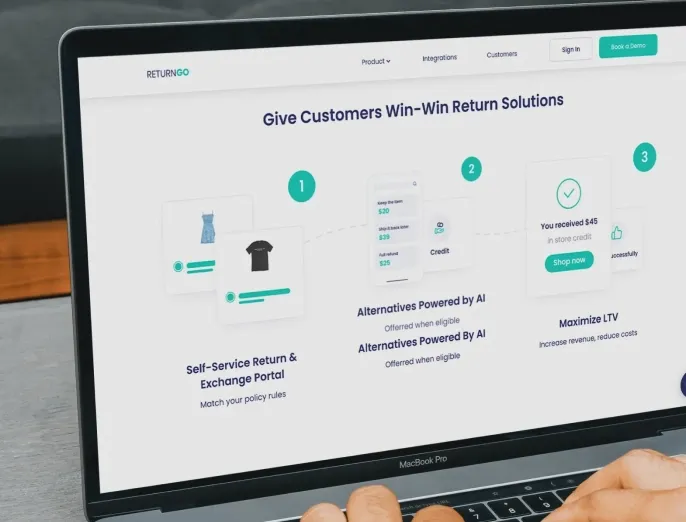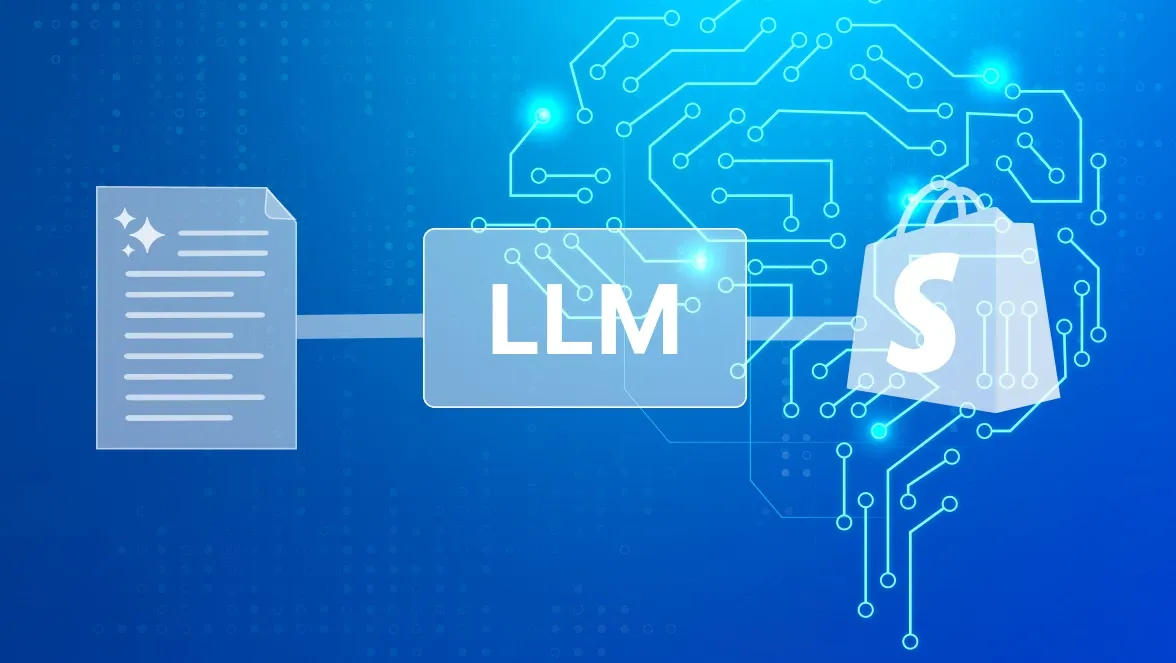
For the past few years, businesses have been trying to leverage the potential of generative AI, or GenAI. Ecommerce is no exception. But despite the growing interest in generative AI, the majority is still navigating how to apply it effectively. Some fail to understand what generative AI for ecommerce is actually capable of. The others see it as a panacea for all woes.
It’s not always clear whether GenAI will drive benefits for your business at its current stage. Hence, it is complicated to understand where to start with generative AI. In this article, we’ll break down the peculiarities of this technology based on GenAI in ecommerce examples. Learn what it is, its benefits, practical applications, and the challenges to consider.
What is Generative AI
Generative AI is a subset of artificial intelligence capable of creating new content – text, images, audio, and video. As Google (which has its own GenAI platform called Gemini) puts it, “Generative AI builds on existing technologies, like large language models (LLMs), which are trained on large amounts of text and learn to predict the next word in a sentence.”
So, here’s a critical point to understand. GenAI in ecommerce (and beyond it) doesn’t create something original and innovative from scratch. It can only produce new content based on data it’s been trained on. That is already huge, but it also outlines the limitations users have to work with.
So, GenAI analyzes large datasets and learns patterns. Then, it uses this knowledge to generate content. Generative AI mimics human-like creativity. But it cannot completely replace the actual human part of work. AI needs new content created by people to evolve. Yet, the ability to process large amounts of data makes GenAI a valuable assistant in various tasks.
How is generative AI used in eCommerce?
Let’s move from theory to practice: real cases of generative AI integration. How does it help ecommerce businesses with actual tasks?
To clarify it, we’ve gathered a list of examples of GenAI’s real-life application. These are just the most common AI use cases in ecommerce. While some of them might seem obvious, the others may surprise you.
Writing product descriptions
Even someone who knows nothing about generative AI can expect at least one thing: it generates content. That’s right. GenAI can automatically create detailed and engaging product descriptions. This capability doesn’t only save time. It improves product discoverability on search engines. The descriptions are created to highlight value for a buyer and are SEO-optimized.
Some platforms already offer dedicated AI-powered tools specifically for this purpose. One such example is Jasper with its Product Description Generator or Shopify Magic, which offers an integrated solution within the Shopify platform itself.
Amazon, eBay, and Alibaba launched platform-native tools to help sellers write product descriptions. All aim to help sellers and shoppers alike.
Personalized recommendations
According to McKinsey, personalization can reduce customer acquisition costs by 50%. It also has the potential to lift revenue by up to 15% and increase ROI by up to 30%. GenAI in ecommerce can provide highly personalized product recommendations. It just needs to analyze your data on customer behavior and preferences.
How does it work? Amazon relies on AI to suggest items based on a customer’s browsing and purchase history. Stitch Fix uses GenAI for several purposes. Besides generating product descriptions, they curate personalized clothing recommendations for subscribers.
Visual search
Image search must be familiar to you from Google’s Search with an image. This technology has been around for a while. However, generative AI can help go beyond basic image matching by providing adaptive, creative outputs and more context-aware results.
Decathlon Belgium allows users to use visual search on their website. Online store recognizes pictures users upload. The website shows the desired item's product page or similar products. The feature implementation led to a 330% higher engagement and 250% higher click-through rate (CTR).
Customer research and analysis
AI in ecommerce helps process extensive user feedback. It can analyze information from various channels. These include reviews, targeted marketing campaigns, user sessions, and more. With these reports, brands can better understand their audience and its needs. Based on this, they can plan for new features and growth strategies.
That’s a strategy Walmart uses. The company applies GenAI to better understand customer queries. They set the algorithms to analyze queries, sessions, and engagement with the items. The result is providing smarter results and aiding in decision-making. For example, users can type “Help me plan a football watch party.” The website will respond with a list of relevant products.
Customer segmentation
The example above shows how businesses can use analytics to improve overall experience. Yet, every brand’s customer base consists of very diverse people. And generative AI can help you get to know each of them better.
HubSpot ran an experiment to test customer segmentation using GenAI. They created a fictional business and described a client base to ChatGPT. The tool responded with a spot-on client analysis and relevant user groups. Though the prompt featured fitness business, it’ll work for ecommerce, too.
Content creation
We’ve already mentioned description generation, but AI’s capabilities stretch far beyond. All AI writing platforms have separate tools for producing different content formats. You can create ads, social media content, emails, blog posts, and more. You can also create visuals for all of them.
H&M group took this experiment further. They launched the print-on-demand merchandise service Creator Studio. It is a generative AI-powered custom clothing creation tool. Anyone can use it to design their own items. The tools transform written prompts into mocked-up apparel within seconds. Users can buy these items. Similarly, you can order a custom design for Nike shoes using Nike By You. Experiments like these show how AI for ecommerce services can turn creative ideas into real, profitable products.
Content localization
If you sell internationally, you know about the benefits of localization. What’s important is that you can automate content translation with GenAI. Amazon is one of the platforms actively using it. As expected, the company designed the Automated Language Translation tool for retailers.
Boosting marketing efforts
Marketing activities are multifaceted, and all call for a personal touch. 80% of customers tend to buy from a company that offers personalized experiences. 69% of online shoppers say that the quality and relevance of messaging influence their perception of a brand. Long story short, marketing requires AI-powered personalization – even hyperpersonalization. And it should be consistent, not fragmented.
AI-powered tools can help personalize chosen messages or entire campaigns. For example, Michaels Stores personalizes 95% of its emails with GenAI. It improved the click-through rate by 25%.
McKinsey also suggests using AI to generate ideas and identify opportunities. It can monitor competitor moves and assess consumer sentiment. It can suggest relevant responses to trends and ideas for personalized interactions for each user segment. Mattel, Kellogg, and L’Oréal already do that.
Virtual try-ons
AI-powered technology allows customers to generate real-time visual representations based on user input. In simple terms, shoppers can visualize how products will look on them or in their environments. It can help engage the audience and reduce return rates. Here are a few examples.
Perfect Corp. introduced AI assistants like BeautyGPT™ and SkincareGPT™ for the respective industries. The features include virtual makeup try-on, skin type and issues analysis, and the simulation of results of using a skincare product. Google also launched a virtual try-on feature for fashion retailers. A generative AI model helps to visualize how clothing drapes, folds, and fits across various body types and poses.
Demand planning
AI drives insights from sales patterns and other relevant data. It enables businesses to optimize inventory levels and prevent stockouts or overstocking. This evidence-based decision-making adds to overall efficiency and sustainability. Generative AI ecommerce can model potential market changes and consumer behavior shifts to produce more precise forecasts.
Zara is among the companies using AI for inventory management. It helped the brand reduce response time to changing consumer preferences and market conditions. Another example is Target. The retailer uses AI to predict demand. Algorithms analyze internal tendencies, customer behavior, and market trends.
Dynamic pricing
AI algorithms can optimize pricing strategies based on real-time market data and customer behavior. In other words, you can adjust prices dynamically when needed. This strategy helps businesses maximize revenue and stay competitive. The easiest way to understand how it works is to see the fluctuating prices in a taxi app during peak hours.
Generative AI propels dynamic pricing forward as it can simulate market conditions and generate adaptive pricing strategies. The result is more sophisticated scenario planning, personalized pricing, and predictive capabilities.
What about ecommerce brands? Walmart, Kroger, and Amazon are reportedly using dynamic pricing strategies. These companies leverage AI-driven systems to analyze factors like competitor pricing, customer demand, seasonality, and even regional preferences.
Fraud detection
AI can identify fraudulent activities, such as fake reviews and account takeovers. A fast response to those protects both businesses and consumers. Like in previous cases, it’s possible thanks to real-time data analysis. Setting up the algorithms to distinguish between regular and suspicious behavior is game-changing.
Generative AI can simulate potential fraudulent scenarios. Also, it can create synthetic data for training more robust fraud detection models. Moreover, GenAI spots complex, evolving fraud patterns more effectively than previous solutions. Currently, this opportunity is prioritized by companies in the financial domain. American Express, BNY Mellon, PayPal, and Swedbank are several examples.
PayPal serves as a prime example of leveraging generative AI for fraud detection. The company uses advanced AI models, including generative AI, to combat fraud on its platform. Since PayPal powers payments for millions of online merchants, its fraud detection system directly protects ecommerce businesses. Merchants using PayPal can benefit from these advanced tools without needing to implement their own fraud detection systems, offering both security and convenience.
Customer support
Let’s wrap up our list of GenAI use cases in ecommerce with 24/7 customer support. It can answer queries, assist with purchases, and handle issues quickly. What’s important is that GenAI can do it in real time and maintain a personalized approach to each client. This means you can reduce issue resolution time to seconds instead of taking who-knows-how-much time.
The North Face has been perfecting online AI shopping consulting since 2016. Amazon, as expected, created its own AI-powered chatbot solution to redefine consumer interaction. Sephora merges virtual try-ons with AI-powered assistance. And there are many more who are already using this opportunity.
Benefits of generative AI in ecommerce
As proved by generative AI use cases in ecommerce, artificial intelligence offers a range of advantages. It helps ecommerce businesses operate more efficiently, providing a better experience for customers. To be more specific, the benefits that make businesses interested in its adoption include the following:
Content optimization. Generative AI can produce appealing and SEO-optimized texts. It can also produce decent multimedia content.
Quicker content production. AI quickly generates copy for all kinds of formats.
Personalized customer experience. AI assistants can come up with product recommendations based on customer behavior and preferences. The same goes for targeted marketing campaigns.
Innovative marketing strategies. Generative AI is good for brainstorming, idea generation, and strategizing. It is also suited for quick competitor analysis.
Enhanced customer service. AI chatbots and intelligent virtual assistant development solutions provide instant customer support and answer common queries.
Data-driven insights. Algorithms can analyze large amounts of data to spot trends, predict behavior, and help businesses make more informed decisions.
Cost-effectiveness. The automation and analytics you get with GenAI reduce manual work, provide accurate insights, and enable faster response to changes.
Businesses can experience many benefits by adopting generative AI in retail and ecommerce. And these are some general examples. AI can be beneficial on many levels, from saving time on routine tasks to devising game-changing strategies.
Considerations of generative AI in ecommerce
Along with numerous benefits, generative AI introduces some challenges to keep in mind. Understanding common considerations equips you with measures to handle them.
Initial investments
Consideration: AI models can be expensive to train and deploy. The upfront costs are often a restraining factor. These include purchasing software, integrating AI into existing systems, and training staff.
Solution: The growing popularity of AI makes it more affordable. Start with smaller-scale AI projects. You can gradually scale them later. Consider open-source AI tools. Pay attention to pay-per-use cloud-based services.
Technical complexity
Consideration: Integrating and maintaining generative AI requires specific expertise. It may be technically complex. Integration typically requires compatibility adjustments, API configurations, or both.
Solution: Consider using an already trained model with easy integration. Another option is hiring an ecommerce company with the relevant expertise like DigitalSuits. They will recommend the most suitable solution and prepare the scaling plan. They will also ensure seamless integration. Such companies also offer various maintenance plans.
Data quality
Consideration: Generative AI systems are only as good as the data they are trained on. Data quality directly impacts the accuracy and relevance of the generated content. Hence, there’s a risk of bias and errors.
Solution: Invest in cleaning and preprocessing before you start. Use accurate and representative data on your target audience. Regularly monitor and review the outputs. Continuously update your data.
Privacy and security
Consideration: Generative AI relies on large datasets to make predictions and produce content. These often include sensitive commercial and customer data. It’s critical to set proper security measures and prevent breaches.
Solution: Set strong security measures, including encryption and firewalls. Ensure compliance with data privacy regulations. Work with reliable AI and security providers to set up the AI model.
Resistance to adoption
Consideration: Some team members may be hesitant to adopt generative AI. It’s often triggered by unfamiliarity with the technology and concerns about job displacement. Meanwhile, the legal team may emphasize ethical considerations.
Solution: Establish clear guidelines and ethical frameworks for AI usage. Use AI to enhance, not replace, human interaction. Educate your team about how AI can complement their work. Ensure training and support.
To sum up
Generative AI is equally exciting and challenging for ecommerce business owners. It can completely redefine core business processes at all levels. Gen AI can handle both minor and complex tasks with equal effectiveness. Meanwhile, it requires changes in the tech ecosystem, approach to work, and team mindset.
Judging from experience, any company can benefit from adopting generative AI. The trick is to prioritize and align your challenges with your current budget. If you need support with this or plan to hire AI engineers to move faster, our development team is ready to help. Contact us when ready, and let’s discuss the value of GenAI for your business.
Frequently asked questions
Is generative AI suitable for small and medium-sized ecommerce businesses?
Yes, generative AI can benefit not only enterprise-level ecommerce businesses but also small and medium-sized ones. Many AI tools and platforms are now accessible and affordable. Despite more limited resources, these businesses often use GenAI to automate tasks. It also works well for personalization and enhancing customer experience.
What are the ethical concerns of using generative AI in ecommerce?
Ethical concerns include the potential for generating biased content, misrepresenting product information, or violating customer privacy. To address this, businesses should implement strict data governance policies, ensure AI outputs are reviewed by humans, and maintain transparency with customers about the use of AI.









































Was this helpful?
0
No comments yet